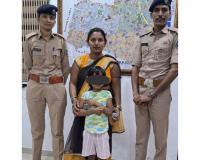IB Teams Begin Intensive Interrogation of 134 Suspected Bangladeshis Arrested in Surat

Surat, April 28 – A special team from the Intelligence Bureau (IB) and West Bengal IB has arrived in Surat to interrogate 134 suspected Bangladeshi nationals who were arrested during a massive operation conducted by the Crime Branch across Surat city and rural areas. All the suspects are currently housed at the Beggary Reception Center in the Rander area.
To streamline the interrogation process, the IB teams have assigned identification numbers and tags to each suspect, following a method similar to that used during police training sessions to ensure precise identification. For in-depth interrogation, IB has divided its personnel into multiple teams, each comprising five officers. Every team is questioning four suspects at a time, and after the initial round, each suspect is being re-interrogated individually to extract more accurate information.
Over 25 IB officers are currently stationed in Surat to oversee this operation. As per media report, the IB teams are meticulously verifying all information, certificates, and documents provided by the suspects. A detailed report based on their findings will soon be compiled and submitted to the Ministry of Home Affairs.
The primary aim of the IB is to gather comprehensive information regarding the entry, residence, and possible networks associated with these individuals in India, ensuring a fact-based and thorough investigation.
In parallel, the Surat City Police is conducting a multi-tiered interrogation at four different levels, involving questioning by Police Sub-Inspectors (PSI), Police Inspectors (PI), Assistant Commissioners of Police (ACP), and Deputy Commissioners of Police (DCP). Ultimately, two senior DCB (Detection of Crime Branch) officers will finalize the overall inquiry report.
While Surat Police is assisting in the process, the IB is playing a central role, carrying out the operation with intensity and strategic precision. Besides questioning each individual, the IB teams are also focused on tracing relatives, potential contacts in other Indian cities, and the specific methods used by the suspects to infiltrate and settle in India.






